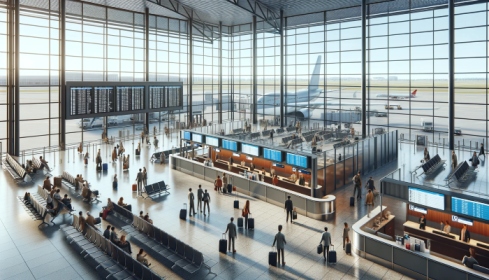HONG KONG — Two airline passengers who locked a stranger’s crying grandchild in a plane restroom have caused outrage in China and sparked a heated online debate on how to handle upset children in public spaces. The incident went viral this week after one of the two women involved posted a video on Chinese social media, which showed them inside a locked lavatory with the wailing girl, who appeared to be about a year old. “We won’t let you out unless you stop crying,” a woman sitting on the toilet told the toddler as she struggled out of the adult’s lap and reached for the door, according to the video posted on Douyin, China’s version of TikTok.
As the girl stopped crying, the woman filming the video picked her up and told her: “If you make any noise again, we’ll come back (to the bathroom).” The incident took place August 24 aboard a Juneyao Airlines flight from the southwestern city of Guiyang to Shanghai. The toddler was flying with her grandparents and cried nonstop during the nearly three-hour flight, the airline said in a statement Monday.

The two passengers took the child to the restroom to “educate her” with her grandmother’s consent, the statement added. But a day later, as criticism mounted, the airline’s customer service department apologized for the incident and “oversight of the crew,” adding it condemned the two passengers’ behavior, according to the state-run Southern Metropolis Daily. One of the women, who posted the video online, said her intention was to ensure a “restful flight” for other passengers.
But her post quickly met a backlash, with many social media users accusing her of being heartless and bullying the child. The video was later deleted. “Adults in their 30s can have emotional breakdowns, but people don’t allow toddlers to have theirs,” said one comment on China’s X-like Weibo platform, garnering thousands of likes.
“We were all once children ...
Don’t be a cold-blooded adult,” read another popular comment. Many others expressed concern that the incident may negatively impact the child’s mental health. Multiple Chinese state media outlets have also weighed in, accusing the two women of “inappropriate” behavior and calling for “greater understanding” from the public toward young children who cannot control their emotions.
In recent years, complaints about young children crying or acting out on flights and trains have regularly trended on Chinese social media, with many accusing parents of not doing enough to manage their kids’ behavior. These incidents have fueled an ongoing debate about parenting in public places in China, where the government is desperately trying to persuade couples to have more children. When was the last time you took hotel bed height into account when making vacation plans? Or have you ever had to consider which hiking trails you could reach without climbing a curb? Whether or not these factors cross your mind, accessibility has long posed significant questions within the travel industry.
accessiBe researched the increasing accessibility of travel—as well as its pain points in an increasingly digital world—to determine how to improve travel technology design for the future. Those with mobility disabilities spend $58.2 billion on travel every year, according to a 2022 report by travel marketing company MMGY Global.
Additionally, they take about as many trips in a year as those without mobility disabilities, often taking caregivers or family members with them as well. Thanks to the efforts of disability advocates across the country, popular destinations like Mesa, Arizona, and New York's Hudson Valley have invested in accessibility via wheelchair-friendly trails and better infrastructure surrounding top attractions. Several major cruise lines, including Princess and Carnival, have likewise tailored their amenities toward folks with limited mobility.
New travel agencies, founded to serve those with accessibility needs, are also working to improve the space. "We decided that the traditional accessibility of the ADA was not enough," Joy Burns, alliance and community coordinator at Wheel the World, told Stacker. The platform maps over 200 data points such as the height of beds, circumference of a room, and turning space to determine how accessible a location is to travelers with disabilities.
Wheel the World is also part of another growing movement in travel: digitization. It's no secret that, much like the rest of our lives, the travel industry has increasingly moved online. According to analytics platform Data.
ai, in 2023, smartphone users downloaded travel apps more than 3 billion times , and they spent nearly 16 billion hours on those apps, compared to 2.68 billion downloads and 12.66 billion usage hours in 2022.
Hotel reservations, flight tickets, day trips, dinner reservations—just about every aspect of vacation prep now happens on a screen. Even something as simple as ordering off a menu often requires scanning a QR code. This shift toward digital trip planning has opened up new possibilities for travelers with disabilities.
"In the past, when a person with a disability called a hotel, you'd get very basic information," she said. "Now, by digitizing all that information, you know exactly what to expect when you show up. It's given so much power and much more confidence to the traveler.
" Though the increased digitization of travel has helped further accessibility in many ways, it has also brought about new issues. Those problems are often particularly apparent within the community of people with disabilities. According to a 2021 Pew Research Center, Americans with disabilities are less likely to own some digital devices .
About 81% of U.S. adults without disabilities said they had a desktop or laptop, compared to 62% of Americans with disabilities.
Similarly, 88% of U.S. adults without disabilities reported having smartphones compared to merely 72% of Americans with disabilities.
People with mobility challenges may struggle to hold a mouse, operate a keyboard, or read a screen, especially since website design often doesn't account for universal accessibility principles. In fact, the 2024 Web Accessibility in Mind report found that 95.9% of home pages failed to meet the organization's Web Content Accessibility Guidelines, which sets the standard for accessibility online.
The state of web accessibility among leading tourist and travel websites is similarly problematic . For example, checkout pages that "time out" after a certain amount of time has elapsed can add an extra layer of difficulty to travel planning. Taking additional steps like adding alternative text alongside images helps people with vision impairments understand the contents of a page better.
Some booking platforms and travel agencies have begun improving digital travel tools to combat these issues. That includes creating websites that people with vision impairments can easily use or designing travel apps based on feedback from individuals with disabilities. Others offer round-the-clock phone assistance to those needing help navigating their site.
In the era of chatbots and automated answering services, having a helpful, human voice on the other end of a phone call can go a long way toward making travel more accessible. But as Burns is quick to point out, these are simply starting points. Much more must be done—in both physical and digital spaces—to foster truly accessible travel experiences.
With so many different disabilities, "you can't say one size fits all because disability is so specific. I think digitizing all that information is the best way to make a better experience for the traveler." Burns said.
In an increasingly digital world, even making that information available online would go a long way toward a more open, accessible world for all kinds of travelers. Story editing by Carren Jao. Additional editing by Kelly Glass.
Copy editing by Kristen Wegrzyn. This story originally appeared on accessiBe and was produced and distributed in partnership with Stacker Studio. Stay up-to-date on what's happening Receive the latest in local entertainment news in your inbox weekly!.



















